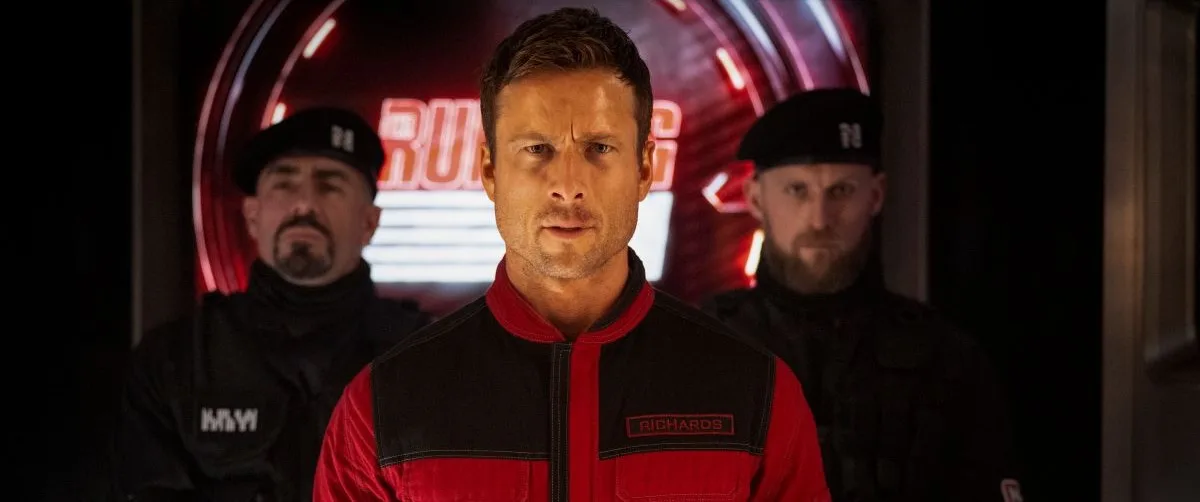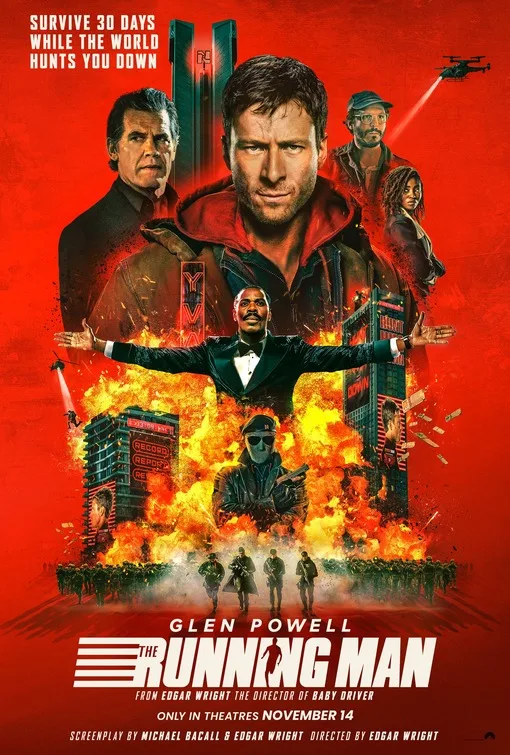Edgar Wright’s remake of “The Running Man,” based on the Stephen King novel about a game show where citizens are hunted by assassins on live TV, hits the ground running and rarely stops. The relentless pace generates enough of an endorphin rush to power the movie beyond plausibility nitpicking. It also prevents the audience from probing its worldview too closely, up to a point. That’s probably for the best. Although this adaptation of King’s book is dirtier and nastier than the 1987 film version, it’s not much more insightful about the nihilistic emptiness and cruelty of modern life. The more distance you get from it, the more it falls apart.
Glen Powell brings a surly, coiled energy to the lead role of Ben Richards. Ben lives in an apartment the size of a two-car garage with his wife Sheila (Jayme Lawson of “Sinners”) and their baby daughter, who’s chronically ill but can’t get the care she needs because medicine is expensive and the wait for treatment is endless. Sheila works long hours at a sleazy joint that might be a brothel or a strip joint—the place is obliquely discussed but never seen—and is considering doing vaguely defined favors for the male clientele to make “tips.” She’s having to earn twice as much as she used to because her husband is unemployed, again. He’s been fired from multiple jobs for insubordination and anger management failures.
Ben is not a criminal, although he’s about to be smeared as one. He’s a decent guy with a strong moral compass who Hulks out on behalf of those who are being bullied. Because what used to pass for a democracy has devolved into a corporate dictatorship that only believes in privilege and domination, Ben is angry every waking moment. His dreams aren’t much fun either. (The Ben Richards of the 1987 film version, played by Arnold Schwarzenegger, was also a slandered man of principle—a police helicopter pilot who had refused an order to fire on food rioters.)
Ben decides that the only way to raise the money to rescue his family is to get one of the many popular game shows that ask contestants to risk humiliation and injury for cash prizes. The only show Ben promised Sheila he wouldn’t audition for is the one with the largest payout: “The Running Man,” in which trios of “Runners” have to cheat death for thirty days while hiding within the general population. Hosted by a glamorous dandy named Bobby T (Colman Domingo), “The Running Man” is a rigged game that hasn’t had a winner yet. Drone cameras track the Runners’ progress while hired assassins known as “Hunters” try to kill them, and citizens collect money for ratting them out. (There’s an app for that.)
The show’s creator and executive producer, Dan Killian (Josh Brolin), thinks Ben has the stuff to be the first (permitted) winner because of his mercurial personality and opposition to the powers-that-be. At first, they portray him as the chiseled white male version of the “Welfare Queens” of 1980s American vernacular—a leech who didn’t appreciate his employers’ generosity, would rather take handouts than earn an honest living, and whose laziness is killing his baby. “He bit the hand that fed him,” Bobby T hollers, stoking the mob’s fury, “because that’s what dogs do!” Sheila is vilified as well. She and the baby have to be relocated so bloodthirsty viewers won’t murder her and the infant.
Undaunted, Ben follows his gut instead of the tainted advice offered by Killian and patches into a secret network of mutual aid providers, including a guns and equipment dealer (William H. Macy), a pro-Runner podcaster (Daniel Ezra), and a gadgeteer (Michael Cera) who’s obsessed with avenging his father, a murdered dissident.
As he’s proved in everything he’s directed, but especially in the so-called “Cornetto Trilogy” (“Shaun of the Dead,” “Hot Fuzz,” “The World’s End”), Wright is a brilliant craftsman who prides himself on making every line and shot count. This film is more evidence of his gifts as a showman. The information-delivery montages have that “Hot Fuzz” snap. The soundtrack (supervised by Kirsten Lane) is stocked with deep-cut bangers, the chases and fights are cut for speed and impact (by Wright’s regular editor, the appropriately named Paul Machliss).
Nevertheless, this is a rare case where you might emerge from the theater wishing the movie had been longer—or had at least slowed down more often to develop the characters. The supporting players that Ben meets on his bloody journey are all quite promising, and the actors playing them make a vivid impression from the instant you meet them. But the arcs they’ve been given are rushed through at such velocity that even the most potentially powerful moments (such as Cera’s character being forced to choose between staying alive and avenging his dad) don’t sink in.
Ben could have been treated with more care, too. The character is a wisecracking, earthy, sarcastic borderline-antihero of a type that Bruce Willis might’ve played brilliantly a quarter-century ago, and his constant, seething aggravation is a reliable source of humor. But he’s defined by two or three emotions at best, which gets tiresome. An actor with the iconic heft of Willis—or Schwarzenegger, whose cartoonishly vivid screen persona made nuance unnecessary—might have drawn the audience more deeply into Ben’s headspace anyway, and made it easier to overlook what’s not there. Powell’s good, but he’s got a long way to go before he can carry a wildly imperfect film on his shoulders.
Where the 1987 film unfolded mainly on lurid TV soundstages and a playing field of neon-lit wreckage, Wright—who cowrote the script with Michael Bacall (“Scott Pilgrim vs. the World”)—situates the remake in a more technologically advanced but ethically degraded version of reality. The vision of plenty that US-produced movies used to sell as The American Dream is a shabby illusion here—one that everyone sees through, including the powerful cynics who resell it to the masses to distract them from the fact that they’re in this awful predicament because the economic system is rigged so that prosperity only flows upward. The citizenry works itself to exhaustion and lives in constant fear of going broke and ending up homeless. The poor wait in endless lines for food. Ben says the happiest day of his life was when his daughter tasted ice cream for the first time, “when our number came up for the park.”
“The Running Man” strives for topicality and proclaims its support for a living wage, affordable, adequate medical care, affordable housing, union protections, and legal accountability for governments and corporations that abuse the public trust. Parts of it have the sting of those cheerfully grotesque TV ads, news reports, and propaganda clips in the original “The Running Man” and Paul Verhoeven’s “Robocop” and “Starship Troopers,” all of which were set in societies bereft of kindness and virtue.
But it all feels a bit too calculated to plug into the zeitgeist. For all its impressive, retrofitted production design and filmmaking prowess, its vision of humanity as a desperate, ignorant mob (save for a few good apples) undermines the idea that things could be better if enough people stand up to power and get the truth out (through ’80s style printed ‘zines; yes, really). There’s no compelling evidence onscreen that the huddled masses that the script is so concerned with are truly moved and edified by watching Ben’s rebellious acts and anti-capitalist slogans on TV, or if he’s just their latest shiny object of distraction.
If the movie didn’t evidently want to be seen as more than mere escapism, none of this would be an issue, but it does, so it is. By the time the final credits roll, “The Running Man” can’t help but feel like less of a madcap sendup of a corrupt society than another product of it, made with the idealistic goal of undermining the machine from inside, but getting ground up in its gears anyway.




















